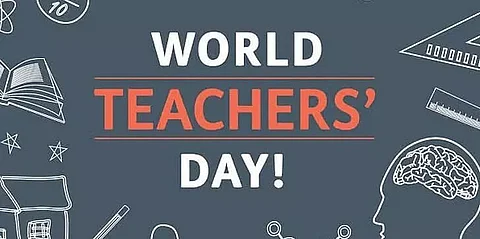
- Home
- Live Blog
- Breaking News
- Top Headlines
- Cities
- NE News
- Sentinel Media
- Sports
- Education
- Jobs

WORLD TEACHERS' DAY
Ranjan K Baruah
(With direct inputs from UN publication and feedback may be sent to bkranjan@gmail.com)
We have seen the impact of COVID- 19 pandemic. This pandemic has affected each and every one of us, including students and teachers. By mid-April 2020, almost every country in the world had implemented nationwide closures of schools and other educational institutions in response to the COVID-19 pandemic, affecting over 1.57 billion learners, representing over 90% of the world's total enrolled student population. This pandemic has not left anyone out including learners like school students and all other students.
There was no other option but to declare lockdown to stop the spread of the virus which has already affected millions of people worldwide. These actions, while essential to contain the spread of the disease and protecting public health, could precipitate a global learning crisis at all levels of the education system.
Learning was not stopped but it was bought homes via digital connectivity as there were no other options. People who are equipped with technology could adjust in a quick span of time but there are millions who are unable to cope up even today. Coping up is a challenge for both educators like teachers as well as learners like the students around the world. At least 63 million primary and secondary teachers alone have been affected by the pandemic to date. Further, disruption to regular learning has impacted students at teacher training institutions, threatening to exacerbate the existing global shortage of qualified teachers in the future. Working in the field of education for years, UNESCO therefore advocates for the protection and support of teachers, principals, and other education personnel, and for recognition of their efforts in the response to the current health crisis and beyond.
In low-income countries in particular, many teachers who have been unable to teach remotely during the current crisis, including contract and para-teachers, face mounting concerns about income and job security. In some parts of the world, teachers have been called on to physically staff schools to keep open key channels of communication with caregivers and communities, and to provide face-to-face education for the children of essential workers, including health workers, as well as for vulnerable children, thus putting their own health at risk to ensure that learning can continue. These are bringing more challenges as there is already a shortage of qualified teachers around the world. Even before the crisis, the world was facing a shortage of qualified and trained teachers, with an estimated 69 million new teachers needed to meet rising demand to achieve universal primary and secondary education by 2030.
Held annually on 5 October since 1994, World Teachers' Day (WTD) commemorates the anniversary of the adoption of the 1966 ILO/UNESCO Recommendation concerning the Status of Teachers. This Recommendation sets benchmarks regarding the rights and responsibilities of teachers and standards for their initial preparation and further education, recruitment, employment, and teaching and learning conditions. The Recommendation concerning the Status of Higher-Education Teaching Personnel was adopted in 1997 to complement the 1966 Recommendation by covering teaching and research personnel in higher education.
With the adoption of the Sustainable Development Goal 4 on education, and the dedicated target (SDG 4.c) recognizing teachers as key to the achievement of the Education 2030 agenda, WTD has become the occasion to mark progress and reflect on ways to counter the remaining challenges for the promotion of the teaching profession. WTD is co-convened in partnership with UNICEF, the International Labour Organization and Education International.
This year, WTD will celebrate with the theme "Teachers: Leading in crisis, reimagining the future". The day provides the occasion to celebrate the teaching profession worldwide, take stock of achievements, and draw attention to the voices of teachers, who are at the heart of efforts to attain the global education target of leaving no one behind.
The issue of teacher leadership in relation to crisis responses is not just timely, but critical in terms of the contributions teachers have made to provide remote learning, support vulnerable populations, reopen schools, and ensure that learning gaps have been mitigated. Few schools have re-started but many are yet to open and continue teaching. There is no doubt that investing in quality pre-service teacher education or initial teacher education (ITE) will be a key in building more resilient education systems post COVID-19. Qualified and passionately motivated teachers are important for ensuring quality education.